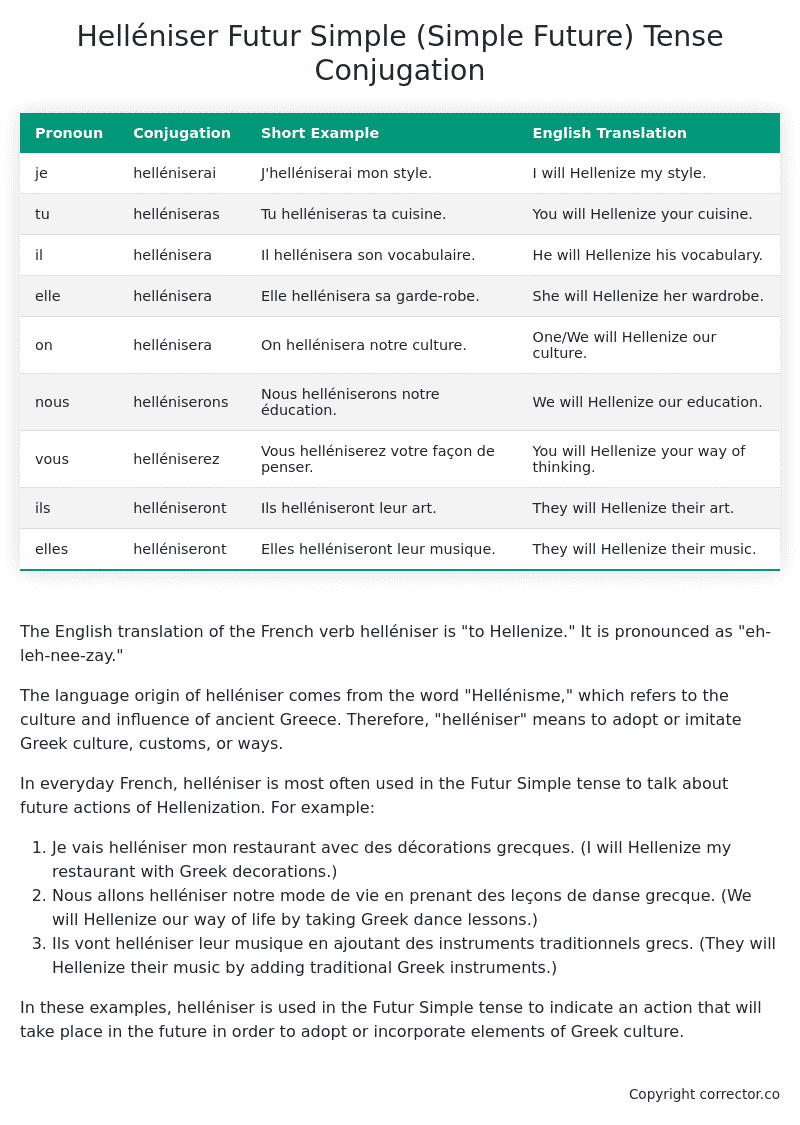Futur Simple (Simple Future) Tense Conjugation of the French Verb helléniser
Introduction to the verb helléniser
The English translation of the French verb helléniser is “to Hellenize.” It is pronounced as “eh-leh-nee-zay.”
The language origin of helléniser comes from the word “Hellénisme,” which refers to the culture and influence of ancient Greece. Therefore, “helléniser” means to adopt or imitate Greek culture, customs, or ways.
In everyday French, helléniser is most often used in the Futur Simple tense to talk about future actions of Hellenization. For example:
- Je vais helléniser mon restaurant avec des décorations grecques. (I will Hellenize my restaurant with Greek decorations.)
- Nous allons helléniser notre mode de vie en prenant des leçons de danse grecque. (We will Hellenize our way of life by taking Greek dance lessons.)
- Ils vont helléniser leur musique en ajoutant des instruments traditionnels grecs. (They will Hellenize their music by adding traditional Greek instruments.)
In these examples, helléniser is used in the Futur Simple tense to indicate an action that will take place in the future in order to adopt or incorporate elements of Greek culture.
Table of the Futur Simple (Simple Future) Tense Conjugation of helléniser
| Pronoun | Conjugation | Short Example | English Translation |
|---|---|---|---|
| je | helléniserai | J’helléniserai mon style. | I will Hellenize my style. |
| tu | helléniseras | Tu helléniseras ta cuisine. | You will Hellenize your cuisine. |
| il | hellénisera | Il hellénisera son vocabulaire. | He will Hellenize his vocabulary. |
| elle | hellénisera | Elle hellénisera sa garde-robe. | She will Hellenize her wardrobe. |
| on | hellénisera | On hellénisera notre culture. | One/We will Hellenize our culture. |
| nous | helléniserons | Nous helléniserons notre éducation. | We will Hellenize our education. |
| vous | helléniserez | Vous helléniserez votre façon de penser. | You will Hellenize your way of thinking. |
| ils | helléniseront | Ils helléniseront leur art. | They will Hellenize their art. |
| elles | helléniseront | Elles helléniseront leur musique. | They will Hellenize their music. |
Other Conjugations for Helléniser.
Le Present (Present Tense) Conjugation of the French Verb helléniser
Imparfait (Imperfect) Tense Conjugation of the French Verb helléniser
Passé Simple (Simple Past) Tense Conjugation of the French Verb helléniser
Passé Composé (Present Perfect) Tense Conjugation of the French Verb helléniser
Futur Simple (Simple Future) Tense Conjugation of the French Verb helléniser (this article)
Futur Proche (Near Future) Tense Conjugation of the French Verb helléniser
Plus-que-parfait (Pluperfect) Tense Conjugation of the French Verb helléniser
Passé Antérieur (Past Anterior) Tense Conjugation of the French Verb helléniser
Futur Antérieur (Future Anterior) Tense Conjugation of the French Verb helléniser
Subjonctif Présent (Subjunctive Present) Tense Conjugation of the French Verb helléniser
Subjonctif Passé (Subjunctive Past) Tense Conjugation of the French Verb helléniser
Subjonctif Imparfait (Subjunctive Imperfect) Tense Conjugation of the French Verb helléniser
Subjonctif Plus-que-parfait (Subjunctive Pluperfect) Tense Conjugation of the French Verb helléniser
Conditionnel Présent (Conditional Present) Tense Conjugation of the French Verb helléniser
Conditionnel Passé (Conditional Past) Tense Conjugation of the French Verb helléniser
L’impératif Présent (Imperative Present) Tense Conjugation of the French Verb helléniser
L’infinitif Présent (Infinitive Present) Tense Conjugation of the French Verb helléniser
Struggling with French verbs or the language in general? Why not use our free French Grammar Checker – no registration required!
Get a FREE Download Study Sheet of this Conjugation 🔥
Simply right click the image below, click “save image” and get your free reference for the helléniser Futur Simple tense conjugation!

Helléniser – About the French Futur Simple (Simple Future) Tense
Formation of Futur Simple
For regular -er verbs (e.g., parler – to speak)
For regular -ir verbs (e.g., finir – to finish)
For regular -re verbs (e.g., vendre – to sell)
Common Everyday Usage Patterns
Conditional Statements
Interactions with Other Tenses
Futur Antérieur
Conditional
Present
Summary
I hope you enjoyed this article on the verb helléniser. Still in a learning mood? Check out another TOTALLY random French verb conjugation!


